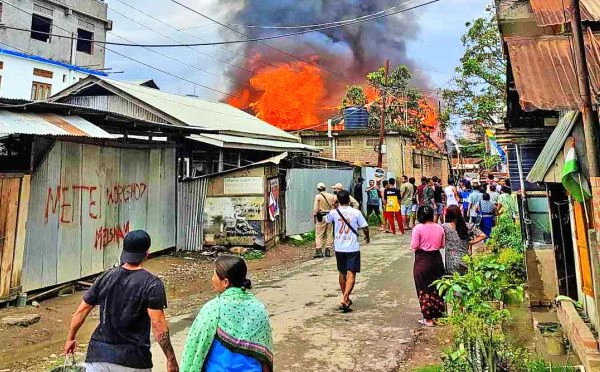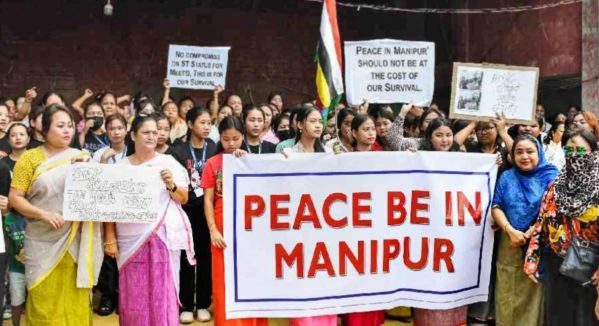
The state of Manipur was in turmoil since May due to ethnic clashes between the Meitei people and the Kuki-Zomi people. The violence resulted in the deaths of over 100 people and the displacement of thousands more.
The clashes began on May 3, 2023, after a Manipur High Court verdict directed the state government to make a decision on whether to grant the Meitei people Scheduled Tribe status. The tribal communities, who are already classified as Scheduled Tribes, protested the Meitei demand, arguing that it would give them an unfair advantage.
The violence quickly escalated, with both sides resorted to arson, looting, and violence. The Indian Army, Assam Rifles, and the Manipur Police were deployed to restore order, but the clashes continued.
The violence has had a devastating impact on Manipur. The economy has been crippled, and schools and businesses have been forced to close. Thousands of people have been displaced from their homes, and many have lost their livelihoods.
The central government called for an end to the violence, and the Manipur government announced a series of measures to address the grievances of the tribal communities. However, sporadic incidents of violence continued.
Historical Causes for Enmity
The enmity between the Meitei and Kuki people in Manipur has a long and complex history. There are a number of factors that have contributed to the conflict, including:
Land and resource disputes. The Meitei people are the majority ethnic group in Manipur, and they have traditionally controlled the most fertile land and other resources. The Kuki people are a tribal group, and they have often been displaced from their traditional lands by the Meitei. This has led to resentment and conflict between the two groups.
Political and economic marginalization. The Kuki people have often felt marginalized by the Meitei-dominated government of Manipur. They have argued that they have been denied their fair share of political representation and economic opportunities. This has led to further resentment and conflict.
Cultural differences. The Meitei and Kuki people have different cultures and customs. This has sometimes led to misunderstandings and conflict between the two groups. For example, the Meitei people are Hindu, while the Kuki people are mostly Christian. This has led to clashes over religious issues.
Historical grievances. The Meitei and Kuki people have a history of conflict, dating back to the 19th century. In 1917, the Kuki people rebelled against the British Raj, which was then ruling Manipur. The rebellion was suppressed, but it left a legacy of bitterness between the two groups.

Recent Events
Some more recent events contributed to the tensions between the Meitei and Kuki people. In 2015, there were a series of clashes between the two groups in Churachandpur district. These clashes were sparked by a land dispute, but they also highlighted the deep-seated mistrust and resentment that exists between the two groups.
The immediate causes of the violence between the Meitei and Kuki communities in Manipur are complex and multifaceted. However, some of the most significant factors include:
The Manipur High Court’s order directing the state government to make a decision on whether to grant the Meitei people Scheduled Tribe status mentioned above.
The Tribal Solidarity March organized by the All Tribal Students’ Union Manipur (ATSUM) in the ten Hill Districts of Manipur on 3 May 2023. The march was in protest against the Manipur High Court’s order and the Meitei demand for Scheduled Tribe status.
The spread of misinformation and rumors on social media. Misinformation and rumors about the Meitei demand for Scheduled Tribe status spread rapidly on social media, fueling tensions between the two communities.
The failure of the state government to address the grievances of the Kuki people. The Kuki people have long felt marginalized by the Meitei-dominated government of Manipur. They have argued that they have been denied their fair share of political representation and economic opportunities. This has led to further resentment and conflict.
Mitigating Measures
The state and central governments took a number of actions to control the situation in Manipur, including:
Deploying security forces. The Indian Army, Assam Rifles, and the Manipur Police have been deployed to the state to restore order and protect civilians.
Imposing curfews. Curfews have been imposed in some parts of the state to prevent further violence.
Prohibiting public gatherings. Public gatherings have been prohibited in some parts of the state to prevent further violence.
Launching investigations. The state government has launched investigations into the violence to identify the perpetrators and bring them to justice.
Providing relief to victims. The state government has provided relief to the victims of the violence, including food, shelter, and medical care.
Appointing a mediator. The central government has appointed a mediator to help the two communities reach a peaceful resolution.
The state and central governments have also taken steps to address the grievances of the Kuki people, including:
Setting up a committee to look into the grievances of the Kuki people.The committee will be headed by a retired judge and will have representatives from both the Meitei and Kuki communities.
Providing more political representation to the Kuki people. The state government has said that it will increase the number of seats reserved for Kukis in the Manipur Legislative Assembly.
Promoting economic development in the Kuki-dominated areas. The state government has said that it will invest in infrastructure and other development projects in the Kuki-dominated areas.
It is too early to say whether these measures will be enough to end the violence and restore peace to Manipur.
Long Term Solutions
Some of the important steps that need to be taken for the long-term include:
Addressing the root causes of the conflict. This includes addressing issues such as land and resource disputes, political and economic marginalization, cultural differences, and historical grievances.
Building trust and understanding between the two communities. This can be done through dialogue, education, and cultural exchange.
Creating a more equitable and just society. This includes ensuring that all communities have equal access to political representation, economic opportunities, and social services.
Promoting peace and reconciliation. This includes supporting initiatives that promote forgiveness, healing, and coexistence.
Here are some additional suggestions for long-term solutions to the conflict:
Establishing a truth and reconciliation commission. This would be a body that would investigate the violence and its causes, and would recommend measures to promote healing and reconciliation.
Creating a more decentralized government. This would give more power to local communities, and would help to address the feeling of marginalization that many Kuki people feel.
Promoting inter-community dialogue and understanding. This could be done through education, cultural exchange, and other initiatives.
Ensuring that all communities have access to justice. This would include ensuring that the police and judiciary are fair and impartial, and that victims of violence have access to compensation and other forms of redress.
Recommendations
For a peaceful resolution to the conflict:
The state government should take steps to address the grievances of the Kuki people. This includes providing more political representation to the Kuki people, promoting economic development in the Kuki-dominated areas, and ensuring that the Kuki people have access to justice.
The central government should appoint a mediator to help the two communities reach a peaceful resolution. The mediator should be someone who is respected by both communities and who has the skills and experience necessary to help them find a mutually agreeable solution.
The media should be more responsible in reporting on the conflict. The media should avoid spreading misinformation and rumors, and should focus on reporting the facts in a balanced and objective way.
Comments
There have been a number of political controversies that have erupted in preventing a peaceful resolution to the conflict. Some political parties have used the conflict to their advantage, stoking tensions between the two communities in order to gain votes.
Peacebuilding is a long-term process. The violence in Manipur is a reminder of the deep-seated ethnic tensions that exist in the state. It is also a reminder of the challenges that the Indian government faces in maintaining peace and order in its northeastern states.
=========================
Events in Manipur
May 3, 2023: Clashes broke out between Meitei and Kuki communities in Churachandpur district.
May 4, 2023: The Indian Army was deployed to Manipur to restore order.
May 5, 2023: The Manipur government imposed a curfew in Churachandpur district.
May 6, 2023: The violence spreads to other parts of Manipur.
May 7, 2023: The central government announced a compensation package for the victims of the violence.
May 8, 2023: The Manipur government announced a series of measures to address the grievances of the tribal communities.
June 1, 2023: The violence subsided, but sporadic incidents continued.
July 14, 2023: The situation in Manipur remained tense, but there were no major incidents of violence.

















